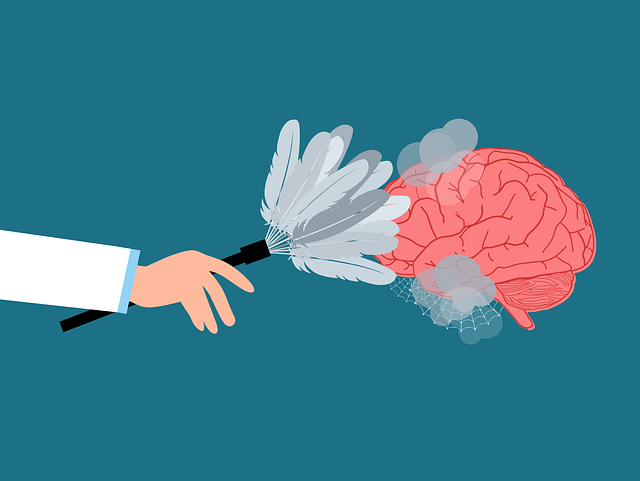Cultural sensitivity in mental healthcare, particularly within Broomfield's diverse communities, is crucial for effective treatment, especially addressing postpartum depression (PPD). By acknowledging and respecting cultural differences, therapists create inclusive environments fostering trust and understanding. This approach tailors treatments, leverages emotional intelligence, and encourages open dialogue. Broomfield Postpartum Depression Therapy (BPDT) emphasizes cultural sensitivity, offering tailored interventions, education programs, and risk assessments to address PPD while empowering patients from various backgrounds. Overcoming language and cultural barriers through training, interpreters, and culturally competent practices ensures effective care, building inner strength and confidence.
In the diverse landscape of mental healthcare, cultural sensitivity is paramount. This article explores key aspects of cultural competency, focusing on postpartum depression (PPD) as a lens into understanding the profound impact of cultural factors. We delve into Broomfield Postpartum Depression Therapy, highlighting its culturally-responsive approach and effectiveness. Additionally, we address barriers to treatment and advocate for inclusive practices that foster support for diverse communities, emphasizing the importance of tailored interventions like Broomfield’s innovative model.
- Understanding Cultural Sensitivity in Mental Healthcare
- The Impact of Cultural Factors on Postpartum Depression
- Broomfield Postpartum Depression Therapy: A Cultural Approach
- Overcoming Barriers to Effective Treatment
- Fostering Inclusive Practices for Diverse Communities
Understanding Cultural Sensitivity in Mental Healthcare

Cultural sensitivity in mental healthcare involves recognizing and respecting the diverse beliefs, values, and practices of individuals from different backgrounds. It’s more than just treating symptoms; it’s about creating a safe, inclusive environment where clients feel understood and supported. By embracing cultural sensitivity, mental health professionals can enhance their ability to connect with clients, build trust, and deliver effective care tailored to their unique needs. This is especially crucial in areas like Broomfield, where a diverse community may include individuals dealing with specific challenges such as postpartum depression, which can manifest differently across cultures.
Understanding these cultural nuances fosters confidence-boosting strategies that promote mental wellness. Emotional intelligence becomes a powerful tool when professionals are attuned to the emotional and cultural landscapes of their clients. This approach not only improves therapeutic outcomes but also strengthens the bond between healthcare providers and those seeking support, ensuring everyone feels heard and validated in their journey towards recovery.
The Impact of Cultural Factors on Postpartum Depression

Cultural factors play a significant role in postpartum depression (PPD), impacting how new mothers from diverse backgrounds experience and express their emotional states. In many communities, discussing mental health openly is still stigmatized, leading to undiagnosed and untreated PPD. For instance, in Broomfield’s diverse population, cultural norms and beliefs can significantly influence help-seeking behaviors. Mothers from certain ethnic groups might prefer traditional support systems over seeking professional therapy for fear of judgment or misunderstanding.
Understanding these nuances is crucial for effective PPD therapy. Cultural sensitivity involves tailoring stress reduction methods and depression prevention strategies to suit individual needs. Conflict resolution techniques, when integrated appropriately, can address intergenerational trauma and strengthen family bonds. By recognizing and respecting cultural differences, mental healthcare practitioners in Broomfield can create inclusive environments that foster open communication, encouraging mothers to seek the help they need without barriers.
Broomfield Postpartum Depression Therapy: A Cultural Approach

In addressing postpartum depression, a cultural sensitivity approach is paramount. Broomfield Postpartum Depression Therapy (BPDT) exemplifies this by tailoring treatments to reflect the diverse backgrounds and beliefs of its patients. This therapy recognizes that mental health experiences are deeply influenced by cultural contexts, ensuring that interventions are inclusive and effective across various communities. By integrating Empathy Building Strategies into its design, BPDT fosters deep understanding and connection between therapists and clients from different cultural backgrounds.
Beyond individual therapy sessions, BPDT may incorporate elements of Mental Health Education Programs to empower expectant mothers and their support systems with knowledge about postpartum mental health challenges and available resources. Additionally, a thorough Risk Assessment for Mental Health Professionals is crucial to ensure practitioners are equipped to handle the nuanced needs of diverse patients while maintaining ethical boundaries and cultural competence.
Overcoming Barriers to Effective Treatment

Overcoming barriers to effective treatment is a crucial aspect of providing culturally sensitive mental healthcare. Many individuals from diverse cultural backgrounds face unique challenges when seeking support for their mental health, especially in specialized areas like Broomfield Postpartum Depression Therapy. Language and communication differences can create a significant hurdle, leading to misdiagnoses or a lack of understanding about available resources. To address this, therapists must be adept at using interpreters or learning basic phrases in the patient’s native language.
Furthermore, cultural beliefs and practices can significantly impact an individual’s perception of mental health and their willingness to engage in therapy. Some communities may view mental illness through different lenses, emphasizing spiritual or community-based solutions rather than professional help. Building trust and fostering a safe, non-judgmental environment is essential to overcoming these barriers. Mental Health Education Programs Design focused on cultural competency can empower both patients and therapists, encouraging open dialogue and promoting the development of inner strength and confidence-boosting strategies tailored to each person’s unique background.
Fostering Inclusive Practices for Diverse Communities

In an increasingly diverse society, mental healthcare practitioners must embrace cultural sensitivity to ensure effective treatment for all communities, including those seeking Broomfield postpartum depression therapy. Fostering inclusive practices involves understanding and respecting different cultural beliefs, values, and traditions that shape individuals’ experiences of mental health and illness. This requires training in cross-cultural competencies, where professionals learn to navigate the nuances of diverse backgrounds, avoid assumptions, and provide care tailored to each patient’s unique needs.
By incorporating mindfulness meditation, empathy building strategies, and other evidence-based practices sensitive to cultural contexts, therapists can create safe and supportive environments. Additionally, mental health policy analysis and advocacy play a crucial role in ensuring equitable access to services for marginalized communities. This includes addressing systemic barriers, promoting representation within the mental healthcare workforce, and shaping policies that reflect the diverse cultural tapestry of patients seeking support for their mental well-being.
Cultural sensitivity in mental healthcare is no longer a consideration, but an essential practice. As we’ve seen, cultural factors significantly influence conditions like postpartum depression, making understanding and adapting treatment approaches crucial. The success of Broomfield Postpartum Depression Therapy demonstrates that tailoring care to a patient’s cultural background can lead to better outcomes. By overcoming barriers such as language, stigma, and mistrust, mental health professionals can foster inclusive practices for diverse communities. This approach ensures that everyone receives the supportive, effective care they need and deserve.














